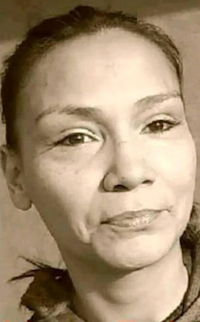SEATTLE — The FBI’s Seattle Field Office is offering a $10,000 reward for information relating to the disappearance of Mary Davis Johnson (Tulalip) who has not been seen since Nov. 25, 2020.

Johnson was last seen walking on the Tulalip Indian Reservation, near Marysville, Wash. Johnson was reportedly walking to a friend’s house and never arrived.
Want more Native News? Get the free daily newsletter today.
She was reported missing by her ex-husband on Dec. 9, 2020.
Johnson is described as 5-foot-6, 115 pounds, with a sunburst-type tattoo on her upper right arm. She was 39 years old when she disappeared.
The FBI, which is working with the Tulalip Tribal Police on the investigation, is offering a reward of up to $10,000 for information leading to the identification, arrest, and conviction of person(s) responsible for Johnson’s disappearance.
In a report released in June 2019 by the Urban Indian Health Institute, a division of the Seattle Indian Health Board, Washington state ranked second in the nation for cases of missing Indigenous women. The city of Seattle ranked first in the nation for missing and murdered Indigenous women and girls.
Anyone with information about the whereabouts of Johnson should call the FBI Seattle Field Office at 206-622-0460 or go to tips.fbi.gov.
Johnson's story was shared on TULALIP TV, a cable channel providing programming to Native households and subscribers to Tulalip Broadband. To view, watch below:
SOURCE: tiʔiɫ ʔəsx̌ʷiĺ (The Missing): Mary Davis Johnson from TULALIP TV on Vimeo.
More Stories Like This
Native News Weekly (August 25, 2024): D.C. BriefsUS Presidents in Their Own Words Concerning American Indians
Indigenous Actor Elaine Miles Reports Detention by Alleged ICE Agents
Happy Thanksgiving from Native News Online
Coming Up on Native Bidaské: Behind the Animation: Joey Clift Talks “Pow” and Native Storytelling
Help us tell the stories that could save Native languages and food traditions
At a critical moment for Indian Country, Native News Online is embarking on our most ambitious reporting project yet: "Cultivating Culture," a three-year investigation into two forces shaping Native community survival—food sovereignty and language revitalization.
The devastating impact of COVID-19 accelerated the loss of Native elders and with them, irreplaceable cultural knowledge. Yet across tribal communities, innovative leaders are fighting back, reclaiming traditional food systems and breathing new life into Native languages. These aren't just cultural preservation efforts—they're powerful pathways to community health, healing, and resilience.
Our dedicated reporting team will spend three years documenting these stories through on-the-ground reporting in 18 tribal communities, producing over 200 in-depth stories, 18 podcast episodes, and multimedia content that amplifies Indigenous voices. We'll show policymakers, funders, and allies how cultural restoration directly impacts physical and mental wellness while celebrating successful models of sovereignty and self-determination.
This isn't corporate media parachuting into Indian Country for a quick story. This is sustained, relationship-based journalism by Native reporters who understand these communities. It's "Warrior Journalism"—fearless reporting that serves the 5.5 million readers who depend on us for news that mainstream media often ignores.
We need your help right now. While we've secured partial funding, we're still $450,000 short of our three-year budget. Our immediate goal is $25,000 this month to keep this critical work moving forward—funding reporter salaries, travel to remote communities, photography, and the deep reporting these stories deserve.
Every dollar directly supports Indigenous journalists telling Indigenous stories. Whether it's $5 or $50, your contribution ensures these vital narratives of resilience, innovation, and hope don't disappear into silence.
 The stakes couldn't be higher. Native languages are being lost at an alarming rate. Food insecurity plagues many tribal communities. But solutions are emerging, and these stories need to be told.
The stakes couldn't be higher. Native languages are being lost at an alarming rate. Food insecurity plagues many tribal communities. But solutions are emerging, and these stories need to be told.
Support independent Native journalism. Fund the stories that matter.
Levi Rickert (Potawatomi), Editor & Publisher

